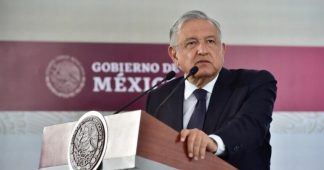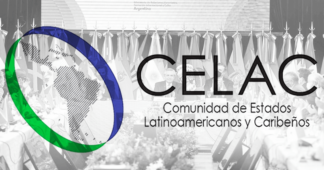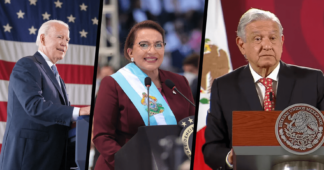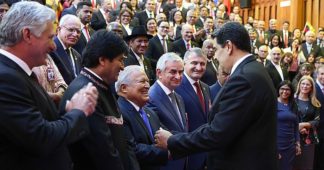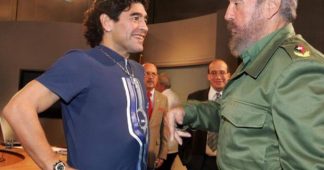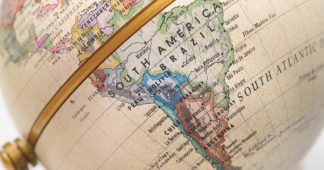The tale of two opposed regional organizations
By Charles McKelvey
The Seventh Summit of the Community of Latin American and Caribbean States (CELAC for its initials in Spanish) takes place today in Buenos Aires, Argentina. The Summit will ratify the Declaration of Buenos Aires and eleven special communiques. I will review and analyze these documents as well as Summit speeches by prominent leaders in my commentary on Friday, January 27. Today, I place CELAC in the context of the Latin American and Third World struggle for sovereignty against U.S. and Western imperialism.
There are a number of factors that contributed to the spectacular U.S. ascent from 1763 to 1965, including: the lucrative trading relation with the slaveholders in the Caribbean during the seventeenth and eighteenth centuries; the core-peripheral trading relation between the slave South and the manufacturing North in the nineteenth century; the conquest of the indigenous nations of North America and Mexico during the nineteenth century; the concentration of industry and banking during the second half of the nineteenth century; and the two world wars of the twentieth century.
The concentration of industry greatly enhanced the productive capacity of the national economy, such that it led to the problem of overproduction, that is, the production of goods in excess of the capacity of the national market to buy. This led the captains of industry to formulate a new foreign policy oriented to the attainment of access to markets for surplus goods outside the United States. They called this new expansionist foreign policy “imperialism.” (See “The robber barons and monopoly capitalism: The origins of US imperialism in Latin America,” June 25, 2021; “The façade of defending democracy: US Imperialism and the military-industrial complex, 1933 to 1964,” June 29, 2021).
In the pursuit of its imperialist agenda, the United States created the Organization of American States, a regional association encompassing all of the Americas, designed as a diplomatic and ideological instrument for the institutionalization of U.S. imperialism. Its goal is “to convert the Latin American governments and peoples into co-participants in the domination exercised over them,” in the words of Cuban scholar Roberto Regalado.
The notion of a Pan-American system was first proposed by Benjamin Harrison’s Secretary of State James Blaine. From 1889 to 1942, twelve Inter-American meetings were convened for the purpose of establishing a regional Inter-American System under U.S. control. But the project could not be implemented, because of resistance from Latin American nations.
However, the United States emerged from World War II at the zenith of its hegemony, with uncontested productive, commercial, financial, and military advantage; and with elevated world prestige. It thus was able to put into practice its Pan-American project, and the Organization of American States (OAS) was established in 1948. The OAS has been particularly oriented to seeking the exclusion of “communism” from Latin America, which was the basis for its expelling of Cuba in 1962. Since 2015, OAS Secretary General Luis Almagro has sought to discredit nations that have declared an intention to construct socialism, including Venezuela, Bolivia, and Nicaragua, in addition to Cuba. Thus, the OAS has become a U.S. instrument in its current unconventional war against targeted Latin American nations. (See “OAS maneuvers against Cuba: US-directed Pan-Americanism and Latin American resistance,” July 30, 2021; “Excluding socialism from America: The historic goal of OAS and the Summits of the Americas,” June 3, 2022).
CELAC is the product of an alternative vision for the region, a vision emerging from the progressive movements that have transformed the politics of Latin America and the Caribbean since the beginning of the twenty-first century. The phenomenon was a reaction to the imperialist turn to neoliberalism—a particularly cruel form of imperialism with respect to socioeconomic consequences—during the 1980s and 1990s.
Although there were some Latin American efforts to reform OAS in the period 2009 to 2014, the primary orientation of the leading governments in Latin America was to establish regional associations separate from the United States, such as ALBA (Bolivarian Alternative for the Peoples of our America) and UNASUR (Union of South American States). The initiative culminated in the establishment in 2011 of the Community of Latin American and Caribbean States, an organization that includes all thirty-three governments of Latin America and the Caribbean and excludes the United States and Canada. CELAC, like the previously formed regional organizations, invoked such principles as respect for the sovereignty of nations, non-intervention in the affairs of states, and mutually beneficial trade among nations, principles that are the antithesis of imperialism.
The alternative vision of CELAC is rooted in the Third World project, which was initiated as a movement against Western imperialism in a conference in Bandung, Indonesia in 1955, when leaders of twenty-nine newly independent nations of Asia and Africa—including Sukarno, Nehru, and Nasser—met to declare a strategy of Third World unity in opposition to European colonialism and Western imperialism. They put forth the common, unifying principles of economic cooperation without exploitation among nations, as the basis for a strategy that could reduce Western imperialist exploitation of their markets, labor, and natural resource. The spirit of Bandung was carried forward with the formation of the Non-Aligned Movement by twenty-one governments of Africa and Asia plus Yugoslavia and Cuba in 1961. Seventy-seven of the non-aligned nations formed G-77 in 1964, seeking to promote mutually beneficial trade among nations. In 1974, the Non-Aligned Movement proposed a declaration that it had developed on a New International Economic Order, approved by the UN General Assembly. It advocated, among other things, the promotion of cooperation among the nations of the Third World. Today, the Non-Aligned Movement has 120 formerly colonized or semi-colonized member nations, including the nations of Latin America and the Caribbean; it continues to put forth its founding principles for a more just international economic order, and alternative to U.S. and Western imperialism. It has today the support of China. (See “Fidel speaks in the name of the colonized: In defense of all of humanity,” August 17, 2021: “China and the Third World: The construction of an alternative, more just world-system,” 10/1/2021; “Non-Aligned Movement commemorates 60 years,” October 22, 2021; “The Construction of a Pluripolar World: The neocolonized peoples seek cooperation and mutually beneficial trade,” December 9, 2022.
The definitive orientation of CELAC was formulated at its Second Summit in Havana in 2014, when CELAC declared its rejection of a U.S.-directed integration. It declared for an integration based on solidarity and cooperation, in a quest for the sustainable and productive development of the nations. It affirmed the commitment of the nations of the region to expand intra-regional commerce and to develop a form of integration based on complementariness. It reaffirmed the principle of the right of nations to control of their natural resources. And it declared that foreign investment should promote the development of the region and should not violate the sovereignty of the nations.
Cuban President Miguel Díaz-Canel has stated that were are in the midst of a Third World War. It is a war between imperialism and the forces of anti-imperialist alternative social construction, which are seeking the development of a more just and democratic, world-system. The Third World War is made evident by the proclamations of CELAC and the maneuvers of OAS.
Intellectuals of the North have the duty to arrive to understand the current world conflict in these terms, given that they are self-evident truths from the perspective of the formerly colonized peoples who constitute the majority of humanity. Moreover, we cannot remain neutral in the name of a false notion of objectivity. We are compelled to take sides.
We remind our readers that publication of articles on our site does not mean that we agree with what is written. Our policy is to publish anything which we consider of interest, so as to assist our readers in forming their opinions. Sometimes we even publish articles with which we totally disagree, since we believe it is important for our readers to be informed on as wide a spectrum of views as possible.
